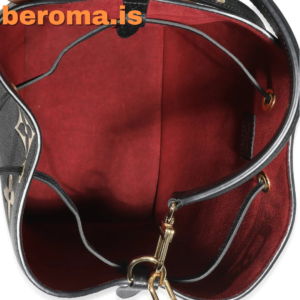The allure of luxury in the fashion industry is unparalleled. It’s a world where the right label can offer a passport into an exclusive society of style and status. In recent years, the fashion world has witnessed a growing trend of “super fake” designer bags that perplex both the luxury enthusiast and purveyors of high-quality fashion. This sophisticated form of counterfeit goods doesn’t just mimic the designs, but they often come dangerously close to authenticity, leaving even the most discerning customers in doubt. But beyond the allure of that Double Vuitton print or the sheen of a Chanel quilt, what are the real costs and who pays the price? This detailed exploration navigates the complex landscape of the super fake luxury handbag market, shedding light on ethical considerations, legal risks, and the broader impact on the fashion industry.
Understanding the Super Fake Designer Bag LV
The term “super fake” has permeated the lexicon of luxury handbag aficionados, highlighting a distinction in counterfeit goods that wasn’t previously recognized. Unlike traditional fake designer bags, super fakes refer to highly detailed replicas that can be virtually indistinguishable from the real deal. They often use top-tier materials and replicate intricate details, such as stamping and stitching, to a flawless standard. This level of deception can lead consumers into thinking they’ve snagged a significant discount on a designer piece, when in fact, they’ve paid the high price of supporting an illegal industry.
The Difference in Detail
What sets a super fake LV bag apart from the genuine article, and from a traditional counterfeit item, is an obsessive attention to even the most minuscule elements. For instance, the stitching on a handle may echo the exact pattern and spacing of its authentic counterpart. The leather might feel and smell like the real thing, or the hardware could bear impeccable engravings that mimic the original brand’s marks with uncanny precision.
Luxury in Limbo
The blurred lines between super fake and authentic carry substantial risks for both sellers and buyers. The former could face severe legal repercussions for selling counterfeit goods, while the latter may endure the ruin of a reputation in the luxury market, or worse, may get entangled in circumstances involving fraud.
The Ethical and Legal Implications
Purchasing a super fake designer bag goes beyond a mere economic transaction. It’s a decision that carries ethical and potentially legal ramifications.
The Unseen Consequences
While some consumers may see buying counterfeit goods as a win against overpriced luxury brands, the truth isn’t so clear-cut. The revenue lost to counterfeiters contributes to a cycle of theft that impacts the livelihoods of countless individuals involved in the legitimate fashion industry, from designers and manufacturers to retailers and salespeople.
When Fashion Is a Felony
The purchase and sale of counterfeit goods are more than just civil issues; they are crimes with potentially serious penalties. Buyers of counterfeits may face personal and financial risks, including involvement in money laundering schemes. For sellers, the charges can be even more severe, bringing about heavy fines and even imprisonment.
Impact on the Fashion Industry
The prevalence of super fake designer bags has not gone unnoticed by the fashion industry. Luxury brands, aware of their products’ value in the counterfeit market, are taking measures to protect their intellectual property and reputation.
Luxury Under Attack
Every counterfeit bag is a blow to the brand’s image and a theft of intellectual property. The painstaking effort that brands put into design, innovation, and quality is mirrored in the counterfeit world for a fraction of the cost, undermining the true value of luxury fashion.
Industry Insights
Fashion experts and industry insiders provide a behind-the-scenes look at how luxury brands are fighting back. Initiatives range from public awareness campaigns to sophisticated anti-counterfeiting technologies embedded in products, designed to aid in the identification of fakes.
Alternatives and Recommendations
For those enamored by luxury but discerning enough to avoid the counterfeit market, there are ethical paths to indulging in high-end fashion.
Supporting Authenticity
Investing in authentic designer pieces is not only a statement of personal style but also a show of support for the integrity and creativity of the fashion industry. It ensures that the artisans who craft these items are fairly compensated for their work.
The Telltale Signs of Authenticity
Learning to distinguish between real and fake designer bags is essential for any fashion enthusiast. There are subtle cues in every brand’s products that can serve as a litmus test for authenticity, such as the quality of materials, the precision of craftsmanship, and the attention to detail in every aspect of the design.
Trusting in Transparency
When shopping for luxury bags, research reputable sellers and insist on all the requisite paperwork – from receipts to authenticity certificates. Online marketplaces can be a treasure trove for authentic finds when approached with caution, ensuring that the splendor of a designer bag comes without the shadow of a doubt.
Conclusion
The market for super fake designer bags may seem like an innocent corner of the fashion world, offering a cost-effective way to participate in luxury. However, the reality is far more complex and the implications far-reaching. From tarnishing the reputation of well-loved brands to contributing to criminal activity, the mirage of a designer bag at a bargain price is one rife with ethical and legal pitfalls. In making mindful purchasing decisions and advocating for transparent and ethical practices, we can all play a part in preserving the genuine splendor of the fashion world. After all, true luxury goes beyond a mere label; it encompasses a history, a craftsmanship, and an authenticity that no counterfeit can replicate.